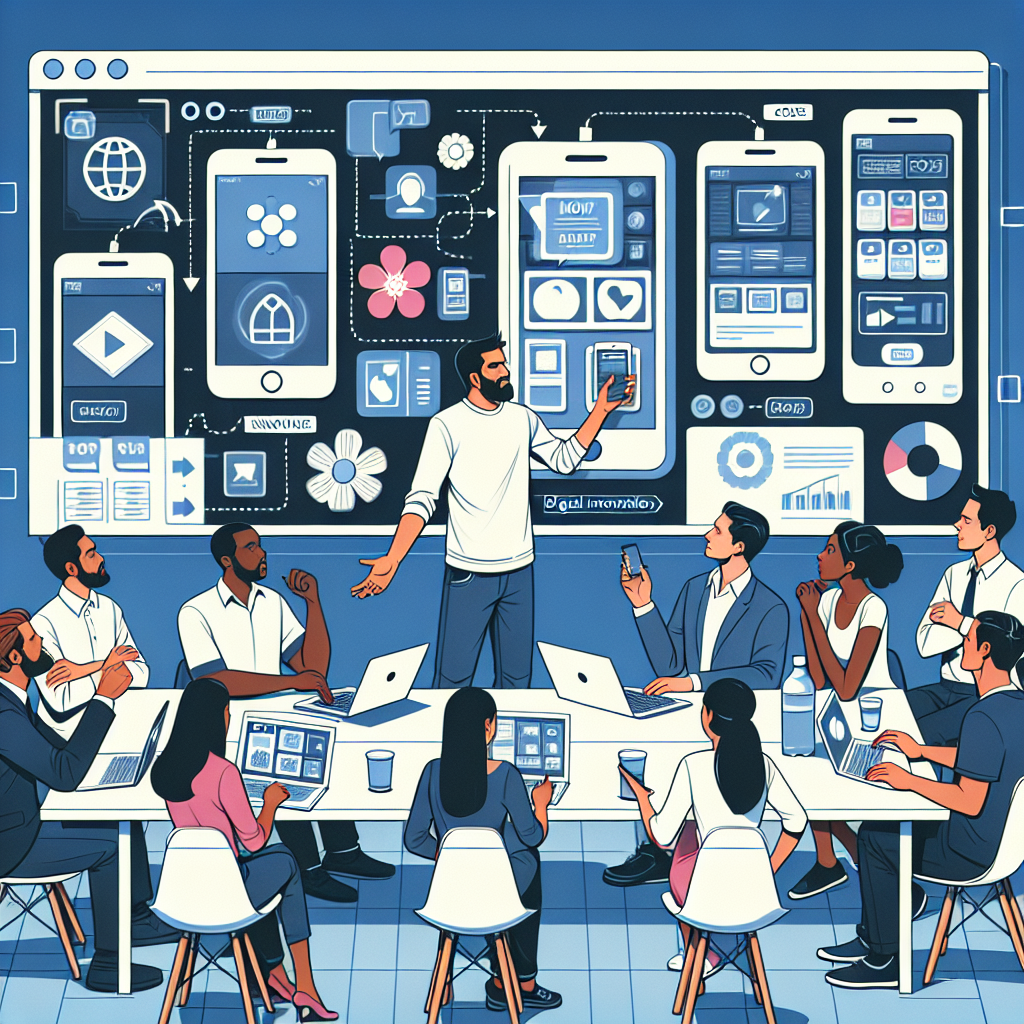In today’s fast-paced digital world, mobile app development plays a crucial role in driving innovation and transforming the way we live, work, and connect with others. From streamlining business operations to enhancing user experiences, mobile apps have become essential tools for businesses and individuals alike. As technology continues to evolve, the demand for innovative mobile applications only continues to grow. This exploration will delve into the world of mobile app development, showcasing the power and potential of creating cutting-edge solutions that drive digital innovation. Join us on this journey as we uncover the endless possibilities that mobile app development offers in shaping the future of technology and digital transformation.
Understanding Mobile App Development

Mobile app development refers to the process of creating software applications that are specifically designed to run on mobile devices such as smartphones and tablets. This involves developing applications for platforms like iOS and Android, utilizing programming languages like Swift, Java, and Kotlin.
Importance of Mobile Apps in Today’s Digital Landscape
Mobile apps play a crucial role in the modern digital landscape by providing users with personalized experiences, convenient access to services, and seamless connectivity. They have become essential tools for businesses to engage with their customers, increase brand visibility, and drive revenue growth.
Evolution of Mobile App Development Technologies
Over the years, mobile app development technologies have evolved significantly to meet the growing demands of users and businesses. From native app development to cross-platform development frameworks like React Native and Flutter, developers now have a wide range of tools and technologies at their disposal to create innovative and feature-rich mobile applications.

Impact of Mobile Apps on Digital Innovation
Enhancing User Experience
- Personalization features
- Mobile apps offer personalized experiences tailored to individual users’ preferences and behaviors.
- By analyzing user data, apps can suggest relevant content, products, or services, increasing engagement.
-
Personalization enhances user satisfaction and loyalty, driving digital innovation through targeted offerings.
-
User-friendly interfaces
- Intuitive design and navigation contribute to a seamless user experience, reducing friction and increasing retention.
- Mobile apps with user-friendly interfaces are more likely to be adopted and recommended by users.
-
Simplified interactions and clear visuals enhance usability, fostering innovation in design and functionality.
-
Integration with emerging technologies
- Mobile apps leverage cutting-edge technologies like augmented reality (AR) and artificial intelligence (AI) to enhance user experiences.
- Integration with emerging tech enables new ways of interaction, such as AR-based product visualization or AI-powered personal assistants.
- By staying at the forefront of technological advancements, mobile app development drives digital innovation and sets new standards for user experience.
Driving Business Growth
Mobile apps play a crucial role in driving business growth by expanding market reach, increasing customer engagement, and improving brand visibility.
Expanding market reach
Mobile apps provide businesses with a platform to reach a wider audience beyond their physical locations. By making their products or services accessible through mobile devices, companies can tap into new markets and demographics that were previously out of reach. This expansion of market reach opens up opportunities for increased sales and revenue.
Increasing customer engagement
Mobile apps enable businesses to interact with their customers in real-time, creating a more personalized and engaging experience. Through push notifications, in-app messaging, and tailored content, companies can communicate directly with their audience, gather feedback, and build lasting relationships. This heightened level of engagement leads to improved customer loyalty and retention rates.
Improving brand visibility
Having a mobile app increases a company’s visibility in the digital landscape. With the app presence on users’ devices, businesses can stay top-of-mind and reinforce their brand image consistently. Moreover, mobile apps offer a prime marketing channel for promoting products, services, and special offers, further enhancing brand visibility and attracting new customers.
In conclusion, the strategic development and utilization of mobile apps are essential for businesses seeking to drive growth and stay competitive in the ever-evolving digital ecosystem.
Key Technologies Shaping Mobile App Development
Artificial Intelligence and Machine Learning
Key Technologies Shaping Mobile App Development
Artificial Intelligence (AI) and Machine Learning (ML) are revolutionizing the landscape of mobile app development by enabling developers to create more intelligent and dynamic applications. These technologies empower mobile apps to make decisions, learn from user interactions, and provide personalized experiences. Here are some key aspects of how AI and ML are shaping mobile app development:
-
Implementing AI algorithms in app functionalities: Developers are integrating AI algorithms into mobile apps to automate tasks, optimize processes, and enhance overall user experience. From chatbots that provide customer support to recommendation engines that suggest personalized content, AI algorithms are transforming how mobile apps function.
-
Enhancing user interactions with ML models: Machine Learning models are being used to analyze user behavior, preferences, and patterns to tailor app interactions accordingly. By leveraging ML, mobile apps can offer predictive text input, smart search functionalities, and customized recommendations based on individual user data.
-
Predictive analytics for personalized user experiences: AI-driven predictive analytics enable mobile apps to anticipate user needs and preferences, thereby delivering highly personalized experiences. By analyzing historical data and user interactions, mobile apps can proactively offer relevant content, products, or services to enhance user engagement and satisfaction.
Internet of Things (IoT) Integration

In mobile app development for digital innovation, the integration of Internet of Things (IoT) technology plays a crucial role in enhancing functionality and user experience. By connecting mobile apps with IoT devices, developers can enable seamless communication and interaction between various smart devices. This integration opens up possibilities for real-time data monitoring and control, allowing users to access and manage information instantaneously. Additionally, IoT sensors can automate tasks within the mobile app, improving efficiency and convenience for users. Overall, IoT integration in mobile app development paves the way for a more interconnected and intelligent digital ecosystem.
Challenges in Mobile App Development for Digital Innovation
Security Concerns
In mobile app development for digital innovation, ensuring robust security measures is paramount to safeguard sensitive information and maintain user trust. Addressing security concerns involves implementing various strategies and technologies to mitigate risks effectively.
-
Data encryption and secure authentication: Utilizing strong encryption algorithms to protect data both at rest and in transit is essential to prevent unauthorized access. Implementing secure authentication mechanisms like biometrics or multi-factor authentication adds an extra layer of protection against potential breaches.
-
Protection against cyber threats and breaches: Constantly monitoring for vulnerabilities and staying updated on emerging cyber threats is crucial in safeguarding mobile apps. Employing intrusion detection systems, firewalls, and regular security audits can help identify and mitigate security risks proactively.
-
Compliance with data privacy regulations: Adhering to data privacy regulations such as GDPR, HIPAA, or CCPA is imperative for mobile apps handling sensitive user data. Ensuring compliance involves implementing privacy-by-design principles, obtaining user consent for data processing, and providing transparent data handling practices to maintain legal and ethical standards.
Cross-Platform Compatibility
hallenges in Mobile App Development for Digital Innovation
Developing mobile applications for digital innovation poses several challenges, with one key hurdle being cross-platform compatibility. Ensuring that an app functions seamlessly across various operating systems such as iOS and Android is crucial for reaching a wider audience and maximizing impact. This compatibility issue involves:
-
Developing apps for multiple operating systems: Programmers and developers must possess the expertise to code for different platforms, each with its unique requirements and constraints. This demands a deep understanding of the intricacies of various operating systems to optimize app performance effectively.
-
Ensuring consistent performance across devices: With the vast array of devices available in the market, maintaining consistent performance across smartphones, tablets, and other gadgets can be daunting. Developers need to test the app extensively on different devices to identify and rectify any compatibility issues that may arise.
-
Utilizing frameworks for efficient cross-platform development: Leveraging cross-platform development frameworks such as React Native, Xamarin, or Flutter can streamline the process of creating apps that work across multiple platforms. These frameworks enable developers to write code once and deploy it on different operating systems, saving time and resources while ensuring a consistent user experience.
Strategies for Successful Mobile App Development
Agile Development Methodology
Agile development methodology is a popular approach in mobile app development due to its flexibility and adaptability to changing requirements. It emphasizes an iterative process that allows for rapid app deployment and continuous improvement based on feedback. This methodology encourages collaboration between developers, designers, and stakeholders to ensure that the final product meets the needs and expectations of all parties involved. By breaking down the development process into smaller, manageable tasks, agile methodology enables teams to prioritize work effectively and make adjustments as needed throughout the project. This iterative approach not only accelerates the app development timeline but also enhances the overall quality of the final product by incorporating feedback and testing at each stage of the development cycle.
User-Centered Design Principles
Strategies for Successful Mobile App Development
User-centered design principles play a crucial role in the success of mobile app development. By focusing on the needs and preferences of the end-users, developers can create apps that are intuitive, engaging, and user-friendly. Here are some key aspects of user-centered design principles:
- Conducting usability testing:
-
Usability testing involves observing real users as they interact with the app to identify any usability issues or areas for improvement. By conducting usability testing throughout the development process, developers can gather valuable feedback and make informed decisions to enhance the app’s usability.
-
Incorporating feedback for UI/UX enhancements:
-
Feedback from users is essential for improving the user interface (UI) and user experience (UX) of the app. By actively seeking and incorporating user feedback, developers can address pain points, optimize navigation, and enhance the overall app experience to meet the needs and expectations of the target audience.
-
Prioritizing user needs and preferences:
- Understanding the unique needs and preferences of the target users is essential for designing a successful mobile app. By prioritizing user needs, developers can tailor the app’s features, functionality, and design to deliver a personalized and user-centric experience that resonates with the target audience.
Future Trends in Mobile App Development
Augmented Reality (AR) and Virtual Reality (VR) Integration
Future Trends in Mobile App Development
Augmented Reality (AR) and Virtual Reality (VR) integration is poised to revolutionize the mobile app development landscape by offering immersive experiences that blur the lines between the physical and digital worlds.
-
Immersive experiences through AR/VR features
AR and VR technologies enable mobile apps to provide users with interactive and engaging experiences by overlaying digital content onto the real world or creating entirely virtual environments. This immersive nature of AR/VR integration enhances user engagement and opens up new possibilities for storytelling, product visualization, and interactive learning experiences. -
Applications in gaming, retail, and education sectors
The integration of AR and VR in mobile apps has found widespread applications across various industries. In the gaming sector, AR/VR features offer gamers a more immersive gameplay experience, blending the virtual and physical worlds seamlessly. In the retail sector, AR apps allow customers to visualize products in real-world settings before making a purchase, enhancing the shopping experience. Additionally, in the education sector, AR/VR integration enables interactive learning experiences that make complex concepts more accessible and engaging for students. -
Advancements in AR/VR hardware and software
The rapid advancements in AR/VR hardware and software have further fueled the integration of these technologies in mobile app development. From more powerful smartphones with advanced sensors to the development of AR glasses and VR headsets, the hardware capabilities for delivering AR/VR experiences continue to evolve. Similarly, software tools and platforms for creating AR/VR content have become more accessible, enabling developers to incorporate AR/VR features into their mobile apps with greater ease and efficiency.
5G Technology Advancements
In the realm of mobile app development, the advent of 5G technology represents a significant leap forward in enhancing digital innovation. This next-generation network technology offers a multitude of advancements that directly impact the capabilities and performance of mobile applications. Below are key aspects of 5G technology advancements that are shaping the future of mobile app development:
-
High-speed connectivity for seamless app performance: One of the most notable features of 5G technology is its ability to deliver unprecedented levels of speed and bandwidth. With speeds up to 100 times faster than 4G networks, developers can create mobile apps that leverage high-definition content, immersive experiences, and real-time data processing without compromising performance. This high-speed connectivity opens up a world of possibilities for delivering seamless app experiences that were previously hindered by slower network speeds.
-
Low latency for real-time interactions: Another critical aspect of 5G technology is its ultra-low latency, which refers to the minimal delay in data transmission between devices. This low latency enables mobile apps to support real-time interactions, such as multiplayer gaming, video conferencing, and IoT applications, with unparalleled responsiveness. Developers can leverage this near-instantaneous communication capability to create innovative mobile apps that prioritize user engagement and efficiency.
-
Opportunities for innovative app functionalities: Beyond speed and latency improvements, 5G technology presents new opportunities for integrating cutting-edge functionalities into mobile applications. Features like augmented reality (AR), virtual reality (VR), artificial intelligence (AI), and Internet of Things (IoT) can be seamlessly integrated into mobile apps, thanks to the enhanced capabilities of 5G networks. These innovative functionalities empower developers to create immersive, personalized, and context-aware mobile experiences that push the boundaries of digital innovation.
In conclusion, the advancements in 5G technology are revolutionizing the landscape of mobile app development, offering unparalleled speed, low latency, and innovative possibilities for creating next-generation digital experiences. As developers harness the power of 5G networks, the future of mobile app innovation is poised to reach new heights of creativity and user engagement.
FAQs Mobile App Development for Digital Innovation
What is mobile app development for digital innovation?
Mobile app development for digital innovation involves creating custom applications for mobile devices that utilize cutting-edge technologies to drive digital transformation within an organization. These apps are designed to enhance user experiences, streamline processes, increase efficiency, and drive growth by leveraging the latest advancements in mobile technology.
Why is mobile app development important for digital innovation?
Mobile app development is crucial for digital innovation as mobile devices have become an integral part of our daily lives. Organizations that invest in developing innovative mobile apps can stay ahead of the competition, reach a wider audience, improve customer engagement, and drive business growth. By leveraging mobile app development, companies can adapt to changing market trends and provide value-added services to their customers.
What are the key benefits of mobile app development for digital innovation?
Some key benefits of mobile app development for digital innovation include enhanced user experiences, improved customer engagement, increased operational efficiency, and the ability to reach a larger audience. Mobile apps can also provide valuable insights through data analytics, streamline processes, automate tasks, and increase brand visibility. Overall, mobile app development can help drive digital transformation within an organization and create new opportunities for growth.
How can organizations ensure the success of mobile app development for digital innovation?
To ensure the success of mobile app development for digital innovation, organizations should prioritize user-centric design, leverage advanced technologies such as artificial intelligence and machine learning, conduct thorough market research, and continuously test and iterate on their mobile apps. It is also important to have a clear strategy, allocate resources effectively, and collaborate with experienced app developers and digital innovation experts to bring innovative ideas to life. By staying agile and adaptable, organizations can maximize the impact of mobile app development for digital innovation.
